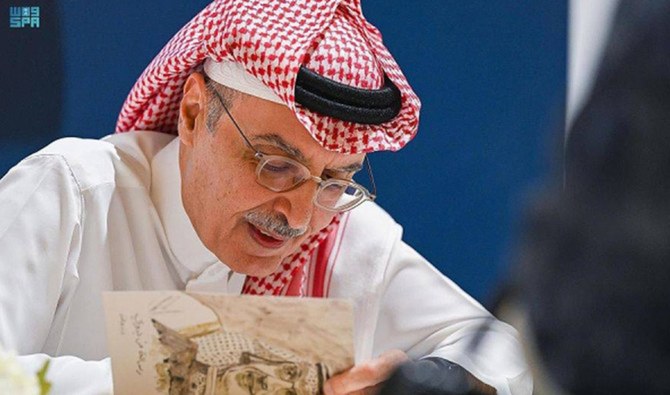Badr bin Abdulmohsin: prodigy, poet, prince

https://arab.news/cs35h
It has been a sad week for Saudi arts and culture, with the sudden death of the poet Prince Badr bin Abdulmohsin. To those who don’t speak Arabic, all I can say is you have missed out on a lot. To use Western sporting terminology, Prince Badr was the Greatest Of All Time in the world of Arabic poetry. In terms of his influence on local culture, he was on a par with the Brazilian novelist Paulo Coelho or the American-English poet T.S. Eliot.
It was therefore no surprise that Arabic-language social media was flooded with condolences by mourners. Fans posted tributes of their favourite poems and song lyrics, from the celebratory “Foug Ham Al-Sohb” (Above the Clouds) sung by the Saudi artist Mohammed Abdo, to the deeply emotional “Al-Mussafer” (Voyager) sung by his compatriot Rashid Al-Majid. With such a large and varied catalog, it can be argued that Prince Badr wrote the soundtrack to the life of a whole generation over nearly four decades (yours truly included!).
And if his death were not bad enough, fans were immediately struck with another heart-breaking revelation: Mohammed Abdo, who could be described as the Kingdom’s Frank Sinatra and is himself a noted interpreter of Prince Badr’s work, has been given a diagnosis of cancer. He is receiving treatment in Paris, and all his performances and engagements have been canceled.
It can be argued that Prince Badr wrote the soundtrack to the life of a whole generation
Faisal J. Abbas
Of course, this is life — it has to end at some point, sometimes much too soon. Yet one cannot help but notice that when Western legends such as Sinatra, Elvis Presley, Whitney Houston, Freddie Mercury and others die, there is no shortage of documentation and celebration of their talent, genius and achievement. It is an unfortunate flaw in our society that we simply don’t have a culture of immortalizing and paying tribute to such rare talent. In fact, until recently, perhaps many around the world did not associate Saudi Arabia with art and culture at all.
To give credit where credit is due, this gap has been the subject of reforms in the Kingdom, and there have been initiatives by the Ministry of Culture and the General Entertainment Authority to address the issue. Stages have been named after Abdo and fellow singing sensation Abu Baker Salem, and there are literary programs to preserve and study eternal works such as those of Prince Badr.
However, more could and should be done. And more importantly, we should not wait for such rare talents to die before we celebrate them, and learn from their experiences.
The same argument, by the way, is equally true and important for living legends in the worlds of politics, business and journalism. We have no shortage of world class talent in all these fields, and each has a remarkable story to tell and valuable lessons to teach.
We lack the notion of transfer of knowledge through autobiographies, masterclasses and workshops.
Faisal J. Abbas
This brings me to another phenomenon: we lack the notion of transfer of knowledge through autobiographies, masterclasses and workshops. Of course, there are exceptions, and the late intellectual, ambassador and minister Ghazi Al-Gosaibi is definitely among them. His Arabic-language books “A Life in Administration” and “The Accompanying Minister” are still must-reads for anyone who wants to work in government. In fact, so insightful and informative is the former that the Ministry of Education made it part of the high school curriculum in 2018.
Two years ago, former Saudi intelligence chief Prince Turki Al-Faisal shared only but a part of his vast experiences and memories with the publication of “The Afghanistan File,” a fascinating chronology and account of his department’s efforts in the aftermath of the Soviet invasion of Afghanistan. Not only did the book provide valuable lessons in dealing with crises, but it also set the record straight on the many misconceptions born out of the vacuum in narrative. And can you imagine how fascinating and informative it would be if a political heavyweight such as Prince Bandar bin Sultan, the Kingdom’s legendary former Ambassador to the US, wrote his memoirs?
In the journalism world, we have living legends who should be persuaded to share their experiences. Among them are former Asharq Al-Awsat editors Othman Al-Omeir and Abdulrahman Al-Rashed, as well as Khaled Al-Malek — editor of the Saudi daily Al-Jazira since 1972, and president of the Saudi Journalists’ Association until this year.
As for the late Prince Badr, whose name in Arabic means “full moon,” all that remains to be said is that, in his absence, the literary space will be a much darker place. May he rest in peace.
- Faisal J. Abbas is the editor in chief of Arab News
X: @FaisalJAbbas








































